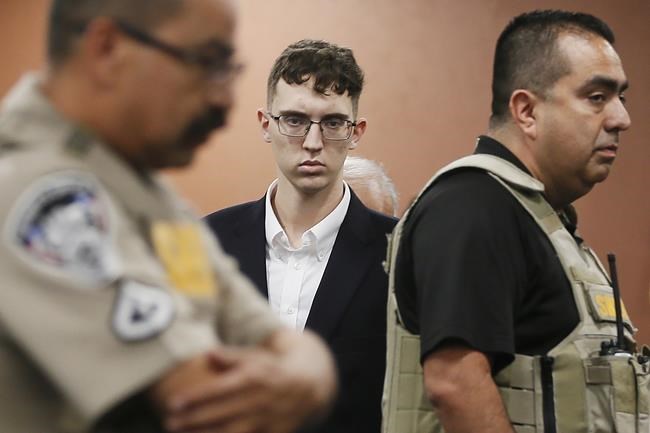EL PASO, Texas (AP) — A white gunman who killed 23 people in a racist attack on Hispanic shoppers at a Walmart in a Texas border city was sentenced Friday to 90 consecutive life sentences but could still face more punishment, including the death penalty.
Patrick Crusius, 24, pleaded guilty earlier this year to nearly 50 federal hate crime charges in the 2019 mass shooting in El Paso, making it one of the U.S. government’s largest hate crime cases.
Crusius, wearing a jumpsuit and shackles, did not speak during the hearing and showed no reaction as the sentence was read. U.S. District Judge David Guaderrama recommended that Crusius serve his sentence at a maximum security prison in Colorado and receive treatment and counseling for a severe mental health condition.
Crusius still faces a separate trial in a Texas court that could end with him getting the death penalty for carrying out one of the deadliest mass shootings in U.S. history.
As Crusius was led from the courtroom, the son of one of the victims shouted from the gallery.
“We’ll be seeing you again, coward," yelled Dean Reckard, whose mother, Margie Reckard, was slain in the attack. "No apologies, no nothing."
Police say Crusius drove more than 700 miles from his home near Dallas to target Hispanics with an AK-style rifle inside and outside the store. Moments before the attack began, Crusius posted a racist screed online that warned of a Hispanic “invasion” of Texas.
In the years since the shooting, Republicans have described migrants crossing the southern U.S. border as an “invasion,” waving off critics who say the rhetoric fuels anti-immigrant views and violence.
Crusius pleaded guilty in February after federal prosecutors took the death penalty off the table. But Texas prosecutors have said they will try to put Crusius on death row when he stands trial in state court. That trial date has not yet been set.
In the U.S. government's case, Crusius received a life sentence for each of the 90 charges against him, half of which were classified as hate crimes. Attorney General Merrick Garland said after the sentencing that “no one in this country should have to live in fear of hate-fueled violence.”
Joe Spencer, Crusius’ attorney, told the judge before the sentencing that his client has a “broken brain.” He said Spencer Crusius had arrived in El Paso without a specific target in mind before winding up at the Walmart.
“Patrick’s thinking is at odds with reality … resulting in delusional thinking,” Spencer said.
Crusius became alarmed by his own violent thoughts, Spencer said, and he once left a job at a movie theater because of them. He said Crusius also searched online to look for ways to address his mental health, and he dropped out of a community college near Dallas because of his struggles.
The sentencing in El Paso followed two days of impact statements from relatives of the victims, including citizens of Mexico and a German national. In addition to the dead, more than two dozen people were injured and numerous others were severely traumatized as they hid or fled.
One by one, family members used their first opportunity since the shooting to directly address Crusius, describing how their lives have been upended by grief and pain. Some forgave Crusius. One man displayed photographs of his slain father and insisted that the gunman look at them.
Crusius’ family did not appear in the courtroom during the sentencing phase.
The attack was the deadliest of a dozen mass shootings in the U.S. linked to hate crimes since 2006, according to a database compiled by The Associated Press, USA Today and Northeastern University.
Before the shooting, Crusius had appeared consumed by the nation’s immigration debate, tweeting #BuildtheWall and posts that praised then-President Donald Trump’s hardline border policies. He went further in his rant posted before the attack, sounding warnings that Hispanics were going to take over the government and economy.
Ian Hanna, an assistant U.S. attorney who prosecuted the government’s case, said Crusius had embraced the “insidious lie” that America only belonged to white people. “He wanted to eliminate a class of people,” Hanna said.
Tito Anchondo, whose brother Andre Anchondo was killed in the attack, called the sentence “the best it’s going to get” because it ensures that Crusius will be left to think about his actions in prison for the rest of his life.
“In a sense justice was served today and in another sense I don’t think anything is ever going to be the same,” he said.
The people who were killed ranged in age from a 15-year-old high school athlete to several elderly grandparents. They included immigrants, a retired city bus driver, teachers, tradesmen including a former iron worker, and several Mexican nationals who had crossed the U.S. border on routine shopping trips.
Two teenage girls recounted their narrow escape from Crusius’ rampage as they participated in a fundraiser for their youth soccer team outside the store, and said they are still fearful in public.
Margaret Juarez, whose 90-year-old father was slain in the attack and whose mother was wounded but survived, said she found it ironic that Crusius would spend his life in prison among inmates from racial and ethnic minorities. Others in the courtroom applauded Thursday as she celebrated their liberty.
“Swim in the waters of prison,” she told Crusius. “Now we’re going to enjoy the sunshine. … We still have our freedom, in our country.”
___
Weber reported from Austin. Associated Press photographer Andres Leighton contributed to this report.
Morgan Lee And Paul J. Weber, The Associated Press



